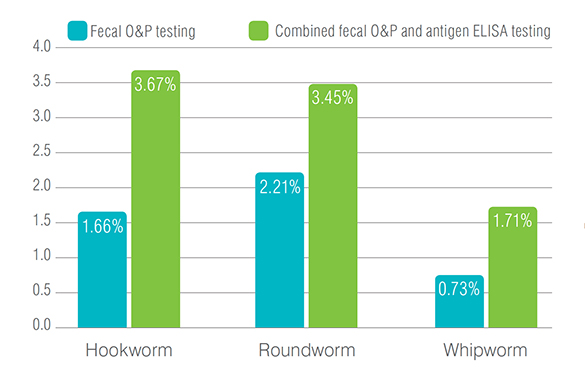
Fecal Dx antigen testing
Double your detection of intestinal parasite infections
Detects 2X more parasites than faecal ova and parasites (O&P) alone.1
A single result identifies hookworm, roundworm, whipworm, and Giardia infections up to 30 days earlier, even when eggs are not present.2
Early, definitive results help you diagnose and treat effectively, reducing the risk of infection to other pets and family members.
Why antigen testing?
The Companion Animal Parasite Council (CAPC) guidelines recommend including faecal antigen testing to diagnose hookworm, roundworm, whipworm, and Giardia infections.3–5
Faecal antigen testing can identify infections that can be missed when using other methods.1 Because the testing detects antigens, positive results confirm the presence of worms in the intestinal tract. This allows you to diagnose infections when worms are not shedding eggs or infections that are caused by worms of a single sex.
For more information: read the diagnostic update, Fecal Dx Antigen Testing—Find Parasite Infections the Microscope Misses.

Results indicate that adding antigen ELISA testing to your faecal O&P may double the number of parasite infections detected.1
Double the number of infections detected by running your fecal tests with IDEXX.
Contact us to learn more
References
- Data on file at IDEXX Laboratories, Inc. Westbrook, Maine USA..
- Elsemore DA, Geng J, Flynn L, et al. Enzyme linked immunosorbent assay for coproantigen detection of Trichuris vulpis in dogs. J Vet Diagn Invest. 2014;26(3):404–411.
- CAPC guidelines: hookworms. Companion Animal Parasite Council website. www.capcvet.org/guidelines/hookworms. Accessed Decemeber 20, 2018.
- CAPC guidelines: ascarid. Companion Animal Parasite Council website. www.capcvet.org/guidelines/ascarid. Accessed Decemeber 20, 2018.
- CAPC guidelines: Trichuris vulpis. Companion Animal Parasite Council website. www.capcvet.org/guidelines/ trichuris-vulpis. Accessed Decemeber 20, 2018.